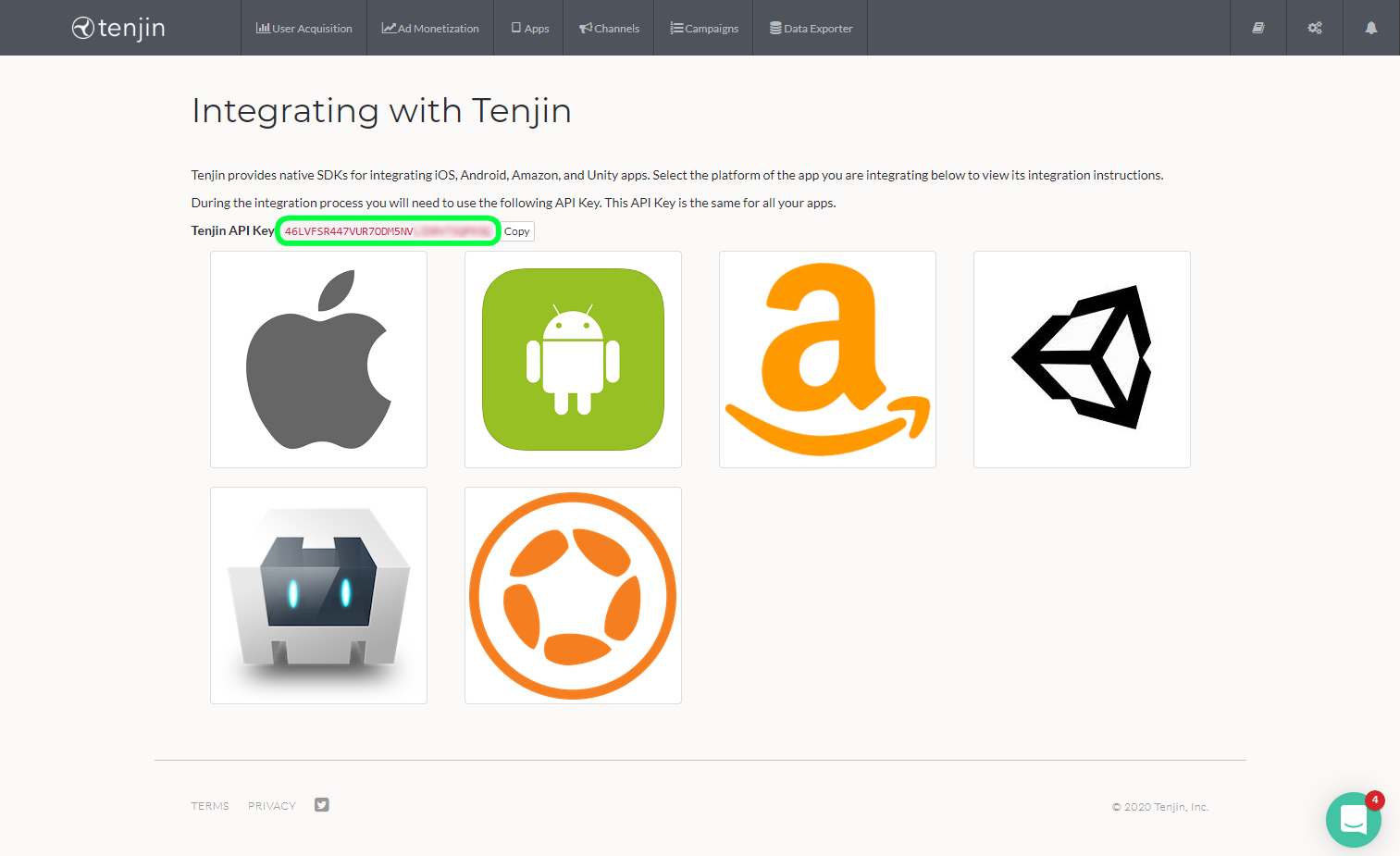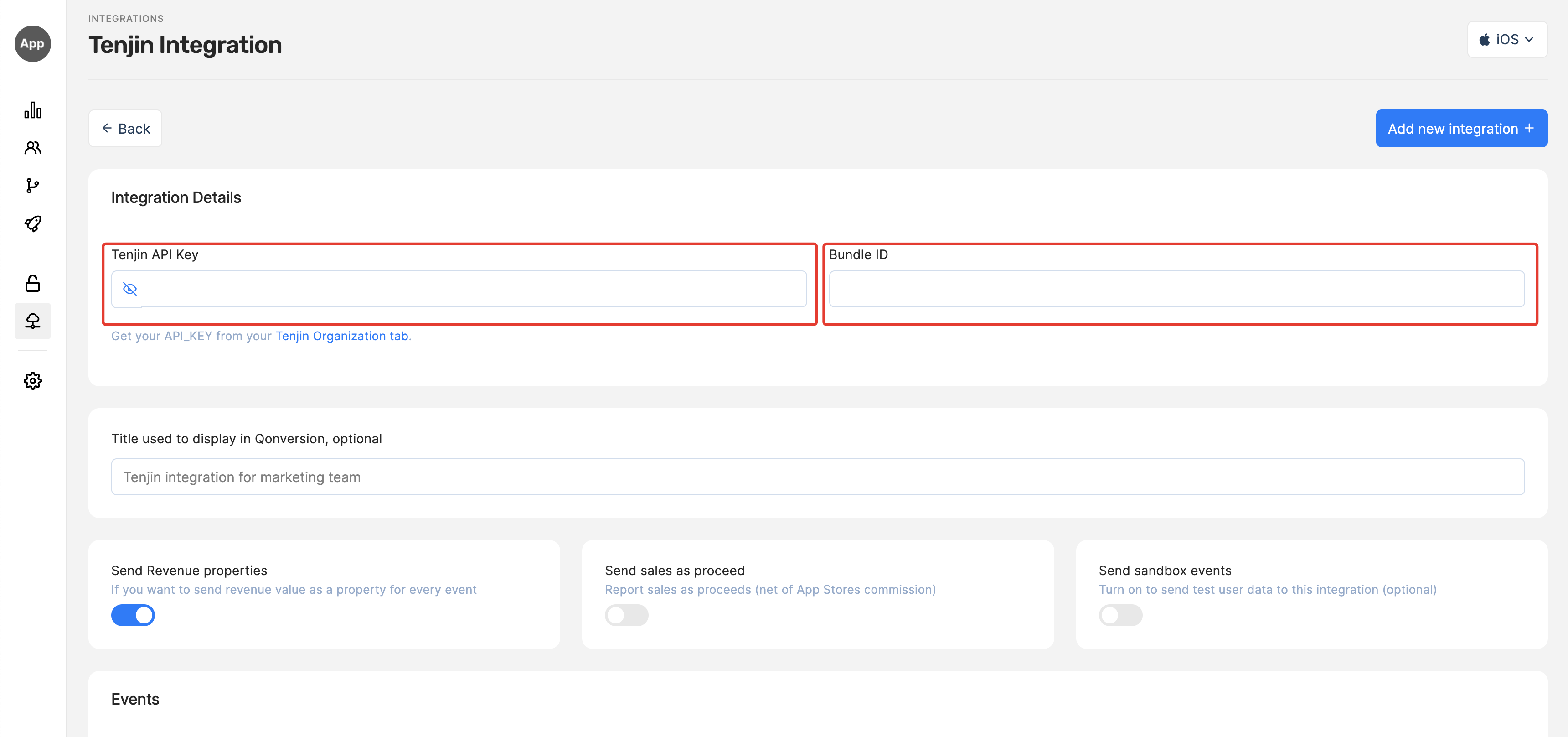Tenjin
Send iOS and Android in-app subscription and purchase events to Tenjin with Qonversion.
Measure what drives your in-app subscription revenue on the ad campaign level by tracking events like trial-to-paying-user conversions, subscription renewals, refunds, upgrades, and other valuable events in Tenjin.
Qonversion tracks revenue even if a user does not open your app. This allows for measuring the cohorts' revenue with 100% accuracy.
1. Provide Integration Details
- Before sending events to Tenjin, ensure you've added your apps to the Tenjin dashboard. Then get your Tenjin API key from the dashboard.

Integration with Tenjin
-
Navigate to the Integrations section in your Qonversion project, select Tenjin, and provide the Tenjin API key and Save.
-
For an iOS app, you should add Bundle ID. For Android App you need to provide the Tenjin API Key only.

Tenijn Integration Settings
2. Setup the SDKs
- Make sure you have Tenjin SDK installed. Check the official Tenjin SDK documentation here
- Set Qonversion SDK following Installing the SDKs guides.
- Send Tenjin
analytics_installation_idto Qonversion via User Properties
let tenjinId = TenjinSDK.getAnalyticsInstallationId()
Qonversion.shared().setUserProperty(.tenjinAnalyticsInstallationId, value: tenjinId)[[Qonversion sharedInstance] setUserProperty:QONUserPropertyKeyTenjinAnalyticsInstallationId value:[TenjinSDK getAnalyticsInstallationId]];TenjinSDK instance = TenjinSDK.getInstance(this, "<SDK_KEY>");
analyticsId = instance.getAnalyticsInstallationId()
Qonversion.shared.setUserProperty(QUserPropertyKey.TenjinAnalyticsInstallationId, analyticsId);TenjinSDK instance = TenjinSDK.getInstance(this, "<SDK_KEY>")
analyticsId = instance.getAnalyticsInstallationId()
Qonversion.shared.setUserProperty(QUserPropertyKey.TenjinAnalyticsInstallationId, analyticsId)String? analyticsId = await TenjinSDK.instance.getAnalyticsInstallationId();
if (analyticsId != null) {
Qonversion.getSharedInstance().setUserProperty(QUserPropertyKey.tenjinAnalyticsInstallationId, analyticsId);
}const analyticsId = await Tenjin.getAnalyticsInstallationId()
Qonversion.getSharedInstance().setUserProperty(UserPropertyKey.TENJIN_ANALYTICS_INSTALLATION_ID, analyticsId);BaseTenjin instance = Tenjin.getInstance("<SDK_KEY>");
analyticsId = instance.GetAnalyticsInstallationId;
Qonversion.GetSharedInstance().SetUserProperty(UserPropertyKey.TenjinAnalyticsInstallationId, analyticsId);Qonversion.getSharedInstance().setUserProperty(Qonversion.UserPropertyKey.TENJIN_ANALYTICS_INSTALLATION_ID, "tenjinAiid");const analyticsId = Tenjin.getAnalyticsInstallationId()
Qonversion.getSharedInstance().setUserProperty(UserPropertyKey.TENJIN_ANALYTICS_INSTALLATION_ID, analyticsId);
Switch off the toggle "Send sales as proceed"Tenjin automatically subtracts App Stores commission, so you need to send gross sales data to Tenjin.
DoneNow Qonversion will start sending in-app purchases and subscriptions data to your Tenjin account.
Event names
You can configure some of the event names for this integration. Purchase events with revenue value (like Trial Converted or Subscription Started) do not have names in Tenjin, so they all have the same default Purchase name in Qonversion.
Event Payload
In case you need details about data sent to Tenjin, follow the example below:
{
"advertising_id": "",
"analytics_installation_id": "",
"developer_device_id": "",
"bundle_id": "",
"platform": "",
"sdk_version": "",
"os_version": "",
"os_version_release": "",
"limit_ad_tracking": "",
"api_key": "",
"ip_address": "",
"country": "",
"app_version": "",
"product_id": "",
"price": "",
"quantity": "",
"currency": "",
}Updated 11 months ago
